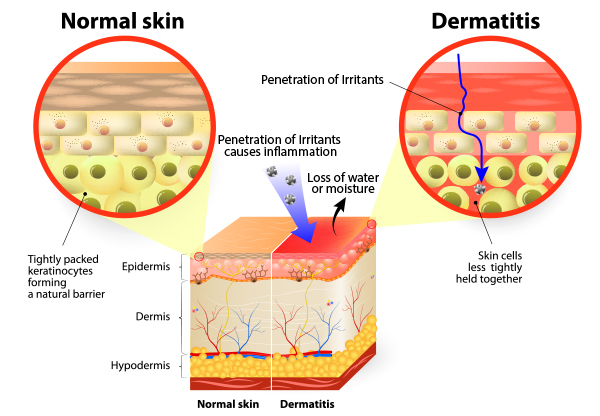What Is Eczema?
Millions of people in the UK are searching for ways to help with the skin condition eczema, also known as dermatitis. Very few understand what it is exactly other than a very common itchy skin condition. It can affect anywhere on the body with symptoms that include inflammation of the skin, redness, scaling, swelling, blistering and cracking. These signs, however, could be due to some other prevalent conditions, so it’s important to do your research on the condition and the existing types of eczema.
How To Identify The Symptoms Of Eczema?
This skin condition appears different at every stage. Since the severity of eczema is varying, it may be hard to know if you have it or it's just dry skin. Most frequently it appears on the face, arms, and legs, but you can see it in other areas too. Your skin may feel itchy and scratchy and can be red, rashy, and/or leathery. With normal-dry skin, it's usually a temporary concern that doesn't tend to be very itchy or inflamed. But eczema can be identified when this dry skin turns into an itchy rash that appears frequently. To confirm and find out how severe the condition of your skin is, you must see a dermatologist. Until then, you can stay away from the triggers which tend to flare up the condition and with the proper management and soothing solutions, you can begin living your life with less trouble from such skin conditions.
The Common Triggers Of Eczema Are:
- Irritants such as harsh soap, shampoo, dishwashing liquid, detergent soap and chemicals
- Rough fabrics such as wool
- Emotional stress
- Change of weather - hot or cold temperature, high humidity and perspiration from exercise
- Certain foods like dairy products, eggs, nuts and seeds, soy products and wheat
When you have eczema, your skin is already over sensitive with dermatitis, and such irritants add fuel to a potentially quick growing fire. These may definitely prompt you to scratch more, which can aggravate already irritated skin and take the condition from mild to severe.
What Causes Eczema?
In some cases, this dry skin condition is thought to be hereditary. So if your parents or someone in your family have it, it might be more likely to be passed on to you. This itchy skin that you inherited may function differently than the normal skin. Where on one hand the normal, healthy skin has an outer skin barrier that helps to keep moisture in and irritants out, skin with eczema has a weak outer skin barrier. As a result your skin can easily lose moisture and allows irritants in, causing dryness and itchiness. Try to avoid scratching which can aggravate and cause flares and find a way that works best for you to soothe the skin.
Different Types Of Eczema
The development of different types of eczema is influenced by a variety of factors. In general, it can be divided into two types, Endogenous and Exogenous. Endogenous eczema is generally influenced by internal factors, while Exogenous is influenced by external factors. The table below further gives you some other common types of this skin condition:
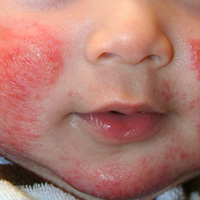
Atopic Dermatitis
This most common form of dermatitis is a hereditary condition, and is often diagnosed in early childhood. Eczema of this type usually first appears on the cheeks and extends to the arms and legs, generally because of a deficiency of a protein called filaggrin. Luckily, it can be treated with therapeutic moisturisers which can help soothe pain and irritation to a great extent.
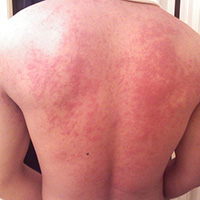
Contact Dermatitis (Irritant & Allergic)
Contact dermatitis is transmitted via contact with substances that the skin is either irritated by or allergic to. This can be something as simple as perfume, soap or water. Under continuous exposure to a particular substance, the skin may develop an allergy resulting in contact dermatitis. Contact dermatitis can be diagnosed by conducting a simple allergy test using the irritant substance.
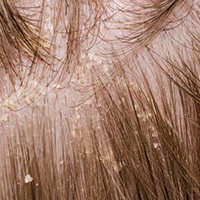
Dandruff Eczema (Seborrheic Dermatitis)
One of the most frequently found types of this skin condition is Seborrheic Dermatitis, more commonly known as dandruff eczema. It typically appears as red scaling on the back and upper chest. This scaling and inflammation can also occur around the face, nose and eyebrows. This is caused by the overgrowth of Pityrosporum ovale, a fungus that naturally occurs in the body.
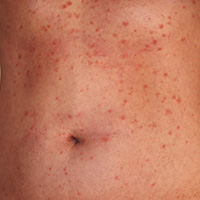
Contact Nettle Fever (contact urticaria)
This is caused by contact with different protein substances, such as those found in various foods and natural rubber. Just like contact eczema, contact urticaria is triggered by exposure to allergens, in this case protein substances. Therefore, the best way to diagnose the condition is by using an allergy test.
How To Get Rid Of Eczema Naturally At Home?
All forms of dermatitis require relatively similar treatment. If you're suffering from contact eczema and your skin is irritated by a particular allergen, the best thing you can do is to ensure you don’t make contact with the source irritant. This can often be difficult, especially if the source of infection is hard to avoid. However, it’s important to minimise contact as much as possible. In the case of atopic eczema, one should try to eliminate certain foods from your diet that may make the condition worse. Therefore they say that what works for one may not work for others due to the varying nature and physiology of the individual. You can also get rid of the itchy skin and prevent itchiness with these tips.
Your treatment should always match the type and severity:
Mild: Avoid use of irritants, such as harsh soaps and shower gels and switching to a regular unperfumed moisturizer for mild eczema.
Moderate: You may choose steroid creams or other medicated creams for moderate to more severe eczema. These may be a prescription free solution.
Severe: Here you can only rely on specialist treatment by a dermatologist. For severe dermatitis, sometimes doctors may even recommend the use of UV light therapy or a powerful solution.
Can A Cream For Eczema Help?
In addition to reducing exposure to the source of infection, using some sort of ointment or cream to target the condition, regardless of which type of eczema you suffer from, is essential. We recommend using natural products as they are more nourishing and hydrating for your skin. If you're suffering from mild dermatitis, we recommend using a gentle and unscented moisturiser.
The Final Word
If you've started looking for an appropriate eczema treatment, you've already taken a sensible decision by getting help and not just living with it. Over-the-counter topical treatments provide a painless option for this itchy skin condition. So, if those itchy, red patches on your skin look like dermatitis, you know there are gentle ways of restoring your clear, smooth and moisturised skin back to health.

